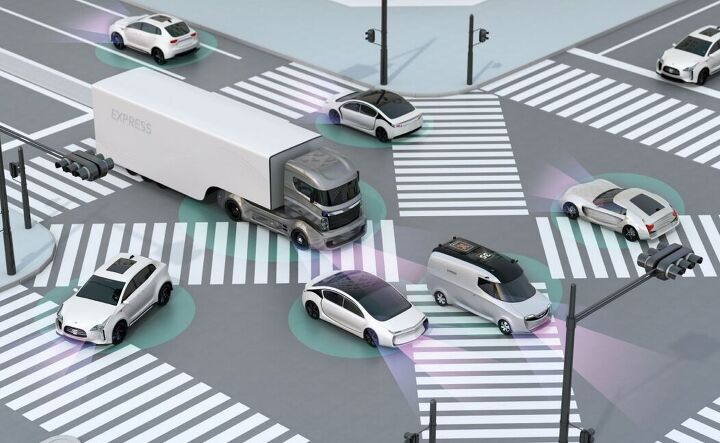NHTSA Deputy Administrator: There's No Need to Regulate Autonomous Cars

Heidi King, deputy administrator of the National Highway Traffic Safety Administration, claims it’s too soon to begin imposing rules on self-driving vehicles. Thus far, the NHTSA as taken a supremely lax posture on handling autonomous vehicles in the hopes that a softer touch will assist in their swift development.
However, a cluster of fatal incidents involving advanced driving technology created fresh paranoia within the government.
While the argument could be made that those accidents demand a response from federal regulators, it’s also clear the government doesn’t have a firm grasp on the technology. Likewise, there’s little consensus among automakers that have only recently begun discussing how these vehicles should be standardized, and loads of conflicting opinions exist on the matter of safety. In the short term, advanced electronic aids allow motorists to become worse at driving. But, if fully autonomous vehicles function as intended, their long-term safety benefits could be immense.
The NHTSA claims the resulting confusion means it’s too early in the process to make any kind of definitive rulings.
“At this point the technology is so nascent I don’t think it is appropriate today to regulate this technology,” King said in an interview with Bloomberg. “It’s not there yet, but each and every day we are open to identifying when the time is right.”
Deciphering when the right time will be is going to be difficult, however. While automakers are likely appreciative of the agency’s hands-off approach, the industry won’t be pleased if the technology is allowed to progress unimpeded for years, then halted by new regulatory measures nobody saw coming.
As certain safety advocacy groups seek new rules, King said NHTSA is focused on dismantling old ones that could impede autonomous technology’s current progression. This year, the agency issued a request for comment from the industry to identify problematic vehicle standards while simultaneously holding roundtable talks to gain a clearer picture of where development is heading.
“In the grand scheme of things in saving lives, impaired drivers and flawed human choices are still the big problems we need to solve as a nation,” King said.
The NHTSA has held the assumption that self-driving cars will ultimately reduce the number of roadway fatalities. But we’ve seen an increase in life-ending accidents since advanced driving technologies became more prevalent. Data from the agency showed fatalities increasing by 10 percent in 2015 and 5.2 percent in 2016.
Figures from last year are inconclusive, but estimates from the National Safety Council claim little to no change. It accused distracted driving and higher speed limits as the primary culprits for the worsening situation and theorized that advanced driving aids may have helped offset the danger.
[Image: NHTSA]

A staunch consumer advocate tracking industry trends and regulation. Before joining TTAC, Matt spent a decade working for marketing and research firms based in NYC. Clients included several of the world’s largest automakers, global tire brands, and aftermarket part suppliers. Dissatisfied with the corporate world and resentful of having to wear suits everyday, he pivoted to writing about cars. Since then, that man has become an ardent supporter of the right-to-repair movement, been interviewed on the auto industry by national radio broadcasts, driven more rental cars than anyone ever should, participated in amateur rallying events, and received the requisite minimum training as sanctioned by the SCCA. Handy with a wrench, Matt grew up surrounded by Detroit auto workers and managed to get a pizza delivery job before he was legally eligible. He later found himself driving box trucks through Manhattan, guaranteeing future sympathy for actual truckers. He continues to conduct research pertaining to the automotive sector as an independent contractor and has since moved back to his native Michigan, closer to where the cars are born. A contrarian, Matt claims to prefer understeer — stating that front and all-wheel drive vehicles cater best to his driving style.
More by Matt Posky
Latest Car Reviews
Read moreLatest Product Reviews
Read moreRecent Comments
- Mike Wasnt even a 60/40 vote. Thats really i teresting.....
- SCE to AUX "discounts don’t usually come without terms attached"[list][*]How about: "discounts usually have terms attached"?[/*][/list]"Any configurations not listed in that list are not eligible for discounts"[list][*]How about "the list contains the only eligible configurations"?[/*][/list]Interesting conquest list - smart move.
- 1995 SC Milking this story, arent you?
- ToolGuy "Nothing is greater than the original. Same goes for original Ford Parts. They’re the parts we built to build your Ford. Anything else is imitation."
- Slavuta I don't know how they calc this. My newest cars are 2017 and 2019, 40 and 45K. Both needed tires at 30K+, OEM tires are now don't last too long. This is $1000 in average (may be less). Brakes DYI, filters, oil, wipers. I would say, under $1500 under 45K miles. But with the new tires that will last 60K, new brakes, this sum could be less in the next 40K miles.


































Comments
Join the conversation
The dawn of autonomous vehicles is literally the last chance for the NHTSA to make a real difference and protect Americans on the road from bad AI. Sensible regulation will save lives...this is criminal negligence...but luckily it is only temporary...
REGULATORS!!!! Munt Up! - Warren G